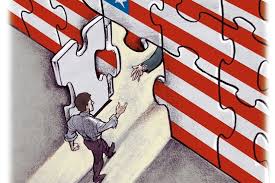Addressing Immigration Issues

Addressing the Immigration Issues
Immigration is working its way to the top of the Republican and therefore Democratic political agendas. Of all the ways to address the issue, on both the left and right sides of the political spectrum, the ones receiving the least attention are methods to address illegal immigration on a person-by-person basis. On one extreme, we have Donald Trump castigating illegal immigrants as criminals and rapists. On the other extreme, liberals on this issue want to provide a path to legal immigration or “amnesty” for the 11 million or 20 million illegal immigrants – we cannot agree on the number – now in the United States. We are polarized by the economic classes benefiting from illegal immigration: wealthy individuals and employers favor cheap labor, Democrats appeal to families of immigrants who want their illegal kindred to have better access to American soil, jobs and citizenship, and the middle class is caught in the middle. Democrats complain that wages are not increasing, but look the other way as millions of foreigners increase the supply of workers and necessarily suppress domestic wages. African Americans for whom the United States Constitution was amended three times sometimes wonder if illegal latecomers should benefit from the Constitution as they do.
American citizenship, domicile and residency, some of the most valuable things in the world, deserve greater protection, more than the Obama Administration and previous administrations provided. Withdrawal of American citizenship from those who leave to fight for terrorist organizations is a start. Senator Cruz supports that. The United States has so far proven incapable of stopping illegal immigrants at the border. Building a very strong wall across the border and aggressively patrolling the border will stop many new illegal aspirants to this country, but it will not rid us of undesirables already here. Convicted criminal aliens explain the popularity of Donald Trump. Ultimately, more aggressive measures are necessary to improve the quality of our immigrants.
Lost in the political strategizing and posturing is a curious unwillingness to deal with immigration on a case-by-case basis. The sole determinant whether any immigrant stays should be whether that individual is helping or hurting the country. This determination would often be a close question, such as when an alien works hard at a local factory and then takes a child to the emergency room to run up a $25,000 bill for which there is no insurance or ability to pay. But the extreme examples used in the immigration debate are easy choices. Convicted criminal aliens ought to be deported as soon as possible. These would include drunk drivers, welfare cheats, drug addicts, drug dealers, unemployed adults and violent offenders. Stern, unrelenting penalties ought to face those who after deportation enter illegally again.
A large federal bureaucracy slowly, inefficiently and passively enforces the immigration laws, letting many aliens stay under lenient “prosecutorial discretion.” In some cases, the hands of border patrol agents and officials are tied. The government with its budget limitations has vacillated between enforcement at the border versus internally. Many foreign nations do not cooperate fully in receiving deported immigrants. The U.S. Supreme Court ruled 5-4 that criminal aliens enjoy the writ of habeas corpus, requiring the release of convicted criminal aliens who are detained too long here. About half of those ordered removed are still in the U.S. at any given time. Clearly, this process needs speed, efficiency, cooperation with the states and aggressiveness.
The "anchor baby" issue must be addressed squarely at some point. While actual birth in the U.S. is often regarded as the ticket to citizenship, and was in prior decades, the new landscape suggests the need for a refinement of the words of the 14th Amendment, the first section of which states,"All persons born or naturalized in the United States, and subject to the jurisdiction thereof, are citizens of the United States and of the State wherein they reside." Anchor babies born in the U.S. to illegal immigrants are not the persons this sentence was designed to equalize. There is an argument that because the parents are not fully subject to U.S. jurisdiction, they and their children should not benefit from the illegal act of entering the U.S.
The benefits and disadvantages of illegal immigration, including the legal immigration that becomes illegal when permits, visas and statuses expire or change, cannot without further study by an army of PhDs accurately determine all the different demographic, tax, labor, banking, insurance, criminal, epidemiological, medical and transnational effects that might deserve study. There is no agreement, and we do not even know how many illegals are here. Inaccurate information and perceptions abound. The agricultural and construction sectors employ massive numbers of legal and illegal immigrants. Pockets of legal and illegal immigrants are accepted throughout the country. Many children of illegal immigrants are among the best students.
In the absence of a definitive study, we should look to what a respected economist said. Milton Friedman found that immigration to jobs was good for the country, but that immigration to welfare benefits is not. There’s the rub: the free movement of labor, goods and capital helps economically, but with America’s generous welfare benefits, illegal immigration of unskilled and uneducated workers is harmful to the extent they access those benefits. Friedman’s solution? Keep immigration illegal and thus bar hard-working illegal immigrants from Medicare, Medicaid, Social Security, food stamps and other benefits. In other words, the status quo is not far from the optimum solution … if only we get control of our borders and accelerate the deportation of convicted criminal aliens.








